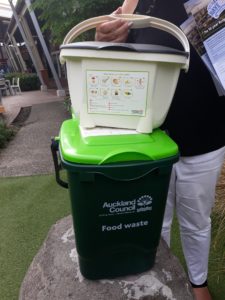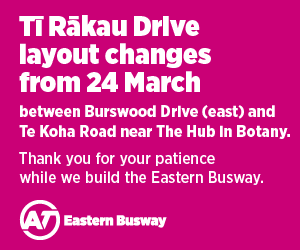
Parul Sood, Waste planning manager Auckland Council responds to queries about the new food waste bins that will be shortly introduced with a targeted rate of $67.
Does everyone have to avail of the bucket bin or is it optional? What about those who are composting the food waste in their backyard?
Like with the household recycling bin service, people cannot ‘opt out’ of the food scrap collection – the service will be covered by rates in the areas it will be provided. The food scraps service will be provided to all households in the urban Auckland region.
Aucklanders can choose whether or not they actually use the food bin. However, the average Auckland household rubbish bag/bin contains around 45 per cent food waste, so using the bin will significantly reduce the amount of waste sent to landfill. This will not only save residents money on rubbish disposal, but it will benefit the environment.
The new food scraps service does not replace home composting. The food waste bin takes all types of food scraps including the ones that are not easily composted, such as meat, small bones and shellfish.
The new food scraps service will also provide those households who currently are not able to home compost with a service to reduce their waste to landfill and provide them with a means of recycling their food waste.
Up to 75 per cent of composters would also use the service as part of a complementary system to managing a household’s food waste. Some items like meat, bones and seafood shells are tricky to compost at home but are more easily processed at commercial level because of the scale and types of equipment used.
The council actively encourages residents to compost and have a number of schemes in place to support this. However, research indicates that a lot of people can’t or have not got the opportunity to compost, so the food scraps service gives everyone the opportunity to reduce their waste and do their bit for the environment.
The benefits of the service are significant for the Auckland region and build on the Love Food Hate Waste programme (to prevent food waste from occurring in the first place) and the Compost Collective programme (to encourage home and community composting of food scraps). World leading environmental cities provide a food collection service.
To date, Auckland Council has provided over 1,000 bags of compost to community groups.
When will it be introduced in East Auckland?
Auckland Council is aiming to progressively introduce a food scraps collection service across the region by 2021. This service will be available to all households in urban Auckland – approximately 490,000 households in total.
As of last week, approximately 18,000 properties in Papakura began receiving the service. And we have got no complains so far. Exact timelines for the implementation of this service in other parts of Auckland have not yet been determined.
Why is there no mention of the cost in Have your Say Auckland?
The targeted rate is mentioned in Issue 3 of the 10-year Budget.
Is it true that the red and yellow lid bins will be collected every second week and the red lid bin which is for general waste will be checked for food waste and fined accordingly.
The rubbish collection service will continue to run weekly for the immediate future. However, over time, Aucklanders will not need to put their bins out every week.
As weekly collections of food scraps remove the largest volume of waste from bins, we expect to be able to reduce refuse collection to a fortnightly service. Aucklanders can choose how often they want to have their bin emptied – only putting the bin out when it’s full can save residents money.
There will be no changes to the fortnightly recycling service. To encourage residents to use the food scraps service and divert it from landfill, we do have bylaw provisions that prohibit food scraps to put in the refuse bin. However this will only be enforced once the food scraps service has been introduced Auckland wide.










